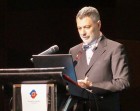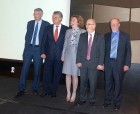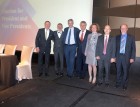On 29 May 2014, in Sofitel Wanda Hotel, the EUCCC presented the results of its latest Business Confidence Survey, an event always closely watched by the media.
I joined the afternoon session where the new President, Joerg Wuttke, gave his as usual sharp overview. Details can be found on the EUCCC website, see:
http://www.europeanchamber.com.cn/en/national-news/2108
Here is my 5 cents worth of highlights:
- Two thirds feel business has become more difficult
- Half feel the “golden age” for MNC has ended
- Overall, more modest expectations, as well as planned expansions
- 45% believe the 3rd Plenum could be an opportunity for reform
- A decrease is expected in revenue growth and margins
- A decline in optimism
- Air pollution is affecting HR, especially in Beijing
- Fewer identify China as the top investment destination
- M&A is slowing down
- Shifting operations to other countries: people think about it but few are going for it
- IPR and environmental laws: still weak enforcement
- About €21.3 billion of missed business opportunities per year due to market access barriers of all kinds.
The Chamber feels SME from Germany, Austria and some other countries are doing well. I always look at those statements with suspicion. A good number of SME are slaughtered in the Chinese market and don’t live to tell their stories. The Chamber thinks they are succeeding as they explore their own niche, avoiding a battle with the big companies. Rosy?
As Joerg mentioned, the media focused a lot on “The golden age for MNC has ended” and giving a rather pessimistic view. I gave my own comments in an interview with China Daily:
http://europe.chinadaily.com.cn/europe/2014-05/30/content_17553752.htm
Some statements in the article:
Nearly half the European companies surveyed are reviewing investment opportunities in other parts of Asia, but so far only one-tenth of the companies have shifted plans from China to elsewhere in the past two years.
“It’s not like ‘Oh, my God, I’m gonna leave’. Actually I see no rush to leave China,” said Gilbert van Kerckhove, president of Beijing Global Strategy Consulting Co.
Van Kerckhove said the survey result should not be interpreted in a completely negative way.
There are some positives, too, as rising competition means China’s local companies are becoming more competitive and rising labor costs mean rising living standards.
“The slowing growth does not mean there is no growth,” van Kerckhove said. “It is not growing as rapidly as before, and that, in a way, is the normal mode.”
…
For human resources departments in European companies, air pollution has become the top difficulty when they try to attract and retain talent.
“Yes, air pollution indeed is a problem. I’ve talked to many HRs, and they all complained of this; high-quality talents are hesitant when making the decision to come to China, especially those with a spouse and kids,” Kerckhove said.
I also said: the situation for MNC has simply changed because Chinese companies have become stronger an better, a normal evolution. So, MNC do not have the market just for themselves.
What was not mentioned, is the one million dollar question: “Are foreigners still welcome in China”?
My answer is certainly not a firm “YES”. On the contrary. But that is a topic most are avoiding …




























